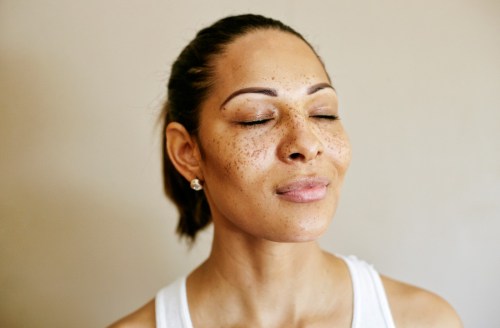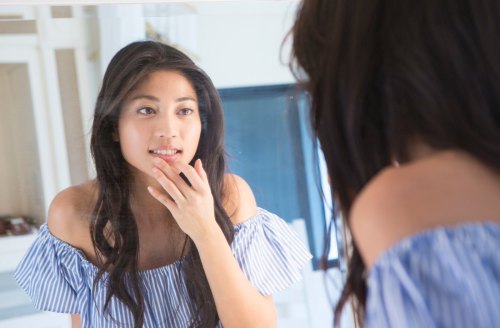Hands off: The methods to keep from picking your skin once and for all
An expert reveals what skin picking is all about, plus ways to stop the habit.

Just like touching your face in general, given a game of Truth or Dare, most of us would have to cop to picking our skin at some point (pimples count!). For many, it’s a here-or-there sitch to address a rogue pimple or dry patch, but for others, chronic, daily picking out of habit or impulse affects roughly 1 in 20 people and about 75 percent of those are women.
“For some, picking can be chronic,” according to Sanam Hafeez, PsyD, a New York City-based neuropsychologist and teaching faculty member at Columbia University Teacher’s College, adding that the frequency can vary from every few minutes to every few hours. “It’s considered a mental health condition related to obsessive compulsive disorder (OCD). Not everyone with OCD will develop skin-picking disorder, but many people who have this disorder often experience OCD, too.” Of course, if you suffer from excoriation, seeking medical care is the best option.
Picking the skin can further irritate existing sores or it can also cause new ones to sprout up, according to Dr. Hafeez.
Because there are plenty of reasons why this isn’t great for your complexion. According to Dr. Hafeez, it can further irritate existing sores, it can cause new ones to sprout up, or it can lead to scarring and scabbing as well. “After picking sessions, your skin could have scabs and lesions all over,” she says. “This may cause you to feel ashamed, starting the cycle of tension and anxiety over again, which can cause another bout of chronic skin picking.”
Dr. Hafeez notes that, despite knowing otherwise, this happens because your brain tells you that if you just do it one more time, your skin will finally look better. It’s an unhealthy cycle that’s hard to stop, yet if it’s left unchecked, it can lead to some serious complications.
“Complications due to compulsive skin picking include tissue damage, infection at the picking site, scarring and disfigurement, epidural abscesses, or a collection of pus around a wound on the skin that emerges during an inflammatory process in response to an infection or the presence of foreign matter, such as splinters, and septicemia, which is a potentially deadly illness that involves a systemic inflammatory response due to severe infection,” says Dr. Hafeez.
Keep scrolling to learn about the methods that can help you stop skin picking.

The Post-It method
The fine print: Chronic, severe picking should be dealt with under advisement of a medical professional. But if you notice yourself picking pimples or scabs on your skin here-or-there, these tricks could help. Sometimes it helps to give yourself little reminders. Dr. Hafeez’s recommendation? Try leaving yourself with Post-it notes. “I will have people put up sticky notes in the bathroom that say things like, ‘Don’t pick!’, ‘Stop picking!’, ‘Don’t touch your face!’” she says. “People get into this state where they are not really mindful of what they’re doing, so [having] that kind of a note helps [remind them to stop].”
This Parisian Skincare Brand Is Launching in the United States for the First Time—Here’s What a Derm Wants You to Know

We’re Calling It: Cleansing Balms Are the Face Wash of the Future—Here Are 3 to Add to Your Cart

This Is the One Product That Scarlett Johansson Always Keeps in Her Purse and on Her Bedside Table

Throw out your tools
Dr. Hafeez says that beauty tools can exacerbate the desire to pick. “Sometimes people are using tools like tweezers or needles, so I make them throw them out,” she says. “And if they have a magnifying mirror, I usually make them toss it. It makes a big difference, and your skin never looks like what it looks like in a magnifying mirror. That’s not reality at all.”
Mindfulness is key
With a skin picking disorder, it tends to mean you’re trying to gain control and better yourself—a characteristic of a type-A personality, according to Dr. Hafeez. “Let’s say that the period of stress that caused you to pick at your skin goes away—inevitably, you will get stressed out again at some point, and that will be your vulnerable spot,” she says. “You might be tempted to do it again. So it’s all about learning who you are and being more mindful and self-aware and asking for help if you need it.”
Cognitive behavioral therapy (CBT)
If you see a professional therapist, they may use a combo of certain different kinds of CBT, says Dr. Hafeez. “The most commonly used is habit reversal training (HBT),” she says. “This is when the therapist teaches the patient to become more self-aware of triggers to skin picking session, and then he or she teaches the patient alternative ways to cope with these triggers.”
To keep your complexion healthy, these are the best supplements for glowy skin. And these are complexion-boosting foods to help.
Sign Up for Our Daily Newsletter
Get all the latest in wellness, trends, food, fitness, beauty, and more delivered right to your inbox.
Got it, you've been added to our email list.







